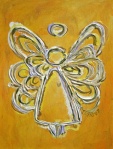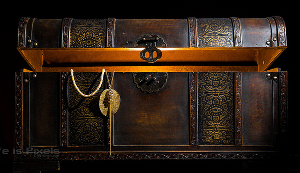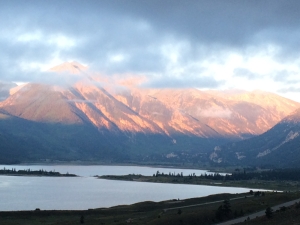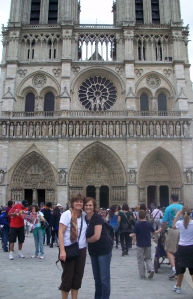Chapter 9 of Becoming Myself, “Beauty Forged in Suffering,” is so full of good stuff, that I found myself underlining and underlining.
And do I know something about beauty forged in suffering. Behold, my little sister. This is sacred ground to me, and I’m sure I won’t get through this post without sobbing.
My sister was one of those fiery, go-get-em kids who wanted the corporate job and six kids. Full of attitude, bullheaded, nothing would stand in her way once she’d made up her mind (we at least have that in common). The goal of corporate stardom dwindled as she matured, but the desire for an army of kids remained. Once she married, she was impatient to have them. As soon as her husband was in accord, she went after it. And something went wrong. The bleeding wouldn’t stop. My little sister just had miscarriage. What? No! This didn’t happen to women in our family. We are a huge family. We are always surrounded by tons of healthy babies. What is this?
 I made the stupid statement or believed foolishly (I hope I didn’t say it aloud) that the worst was behind her. For a while this seemed true. She soon gave birth to a healthy, gorgeous baby boy. Then came another miscarriage. Then–six years ago in October–came Baby Vaune. I remember when my sister was picking out girl names for this baby. She wanted a name with dignity, a name that would “grow up with her.” To settle on a name, she had to be able to envision a woman in a suit introducing herself with that name. So “Vaune” it was.
I made the stupid statement or believed foolishly (I hope I didn’t say it aloud) that the worst was behind her. For a while this seemed true. She soon gave birth to a healthy, gorgeous baby boy. Then came another miscarriage. Then–six years ago in October–came Baby Vaune. I remember when my sister was picking out girl names for this baby. She wanted a name with dignity, a name that would “grow up with her.” To settle on a name, she had to be able to envision a woman in a suit introducing herself with that name. So “Vaune” it was.
Vaune was born the day before Halloween; she was going to be “our little black cat.” We were astonished to hear that she weighed only a little over 5 pounds. Whoa, what? We finally get to have a small baby? Other women have small babies; women in our family have babies between 7 and 10 pounds. We were astonished at first, but not yet alarmed. Then the doctor came in and told us that all was not well, and Vaune needed to be flown to a bigger hospital for tests.
I cannot describe the physical pain that descended throughout my body. I had never felt that kind of pain before. I can only imagine what my sister felt, still in her bed robe and hooked up to monitors, or our mother who was sitting beside me and could not protect her own baby from this. I’m not sure how Mom and I ended up in that room alone; all I know is that as soon as we were alone, she grabbed me and started praying. “God, we trust you. We don’t know what this is, but we trust you.”
A few days later, we learned that Vaune had Edward’s Syndrome or Trisomy 18. We did our research and discovered that, unlike Downs’ Sydrome, Edward’s is 100% fatal by the age of 2 and that 1 in 3000 miscarriages is caused by this particular syndrome. We started counting the days. Mercifully, my sister was allowed to bring Vaune home and bring in hospice care. She and her husband and our mother learned how the feeding tube worked, along with the other monitors needed to keep tabs on what was happening inside Vaune’s little body. I tell you, I held that baby every chance I got. I held her so I could see her face and talk to her because I knew our time was short, and I wanted to memorize her sweet little face.
I won’t go into the details, but Jesus came for Vaune on December 7th.
I remember being afraid that this would make my sister a hard, unhappy, bitter person, who resented God and became untouchable to her husband and her family. The opposite is what happened. Through that process of pain and healing and surrendering to the care and sovereignty of God, my sister became the most beautiful person I have the privilege of knowing. I sit back and watch her, in her service to others, with her kids, in her relationship with her husband, in her trust in her God, and I am in awe. This is my little sister(?!), and she is stunning. Yes, she still can be bullheaded, and still has that fiery temperament that has earned us the nickname “the dragon sisters,” but her loss instilled in her a sense of right priorities and unshakable faith.
 Did God cause Vaune to have Trisomy 18? I doubt it. But God used that time of unimaginable pain to create something exquisite inside my sister, to strengthen our faith, and in my case, for sure, to prove that I had it at all. I learned that during life’s worst moments, I do know where to turn, I won’t resort to blind anger, we won’t fall apart. And I can tell you that during those few weeks while Vaune was with us, I have never felt more strongly the presence of God. The peace that surrounded us was so palpable I could almost reach out and grab a fistful of it.
Did God cause Vaune to have Trisomy 18? I doubt it. But God used that time of unimaginable pain to create something exquisite inside my sister, to strengthen our faith, and in my case, for sure, to prove that I had it at all. I learned that during life’s worst moments, I do know where to turn, I won’t resort to blind anger, we won’t fall apart. And I can tell you that during those few weeks while Vaune was with us, I have never felt more strongly the presence of God. The peace that surrounded us was so palpable I could almost reach out and grab a fistful of it.
I can look back on that time and know absolutely that God is with us, that he does care about the intimate details of our lives – and if we let him, he can take that horrible, undesirable situation and with those hands that flung out the stars, forge something stronger and lovelier inside us than we ever expected.
Favorite Quotes
“In this world you will have trouble.” John 16:33
“Do not be surprised at the painful trial you are suffering, as though something strange is happening to you.” 1 Peter 4:12
“Christianity is not a promise to enjoy a life without pain…. It is a promise that pain, sorrow, sin—ours and others’—will not swallow us, destroy us, define us, or have the final word.”
(Becoming Myself, 146)
“The very first thing painful trials try to do is separate us from God. But being separated from God is the worst thing that can happen, much worse than the most excruciating of trials.”
(Becoming Myself, 147)
“God created a world where the choices of angels and human beings matter. We are not puppets on a string. When someone sins, it is not God causing them to sin. That sexual abuse was not arranged by God; he did not cause your brother to be raped any more than he caused those terrorists to bomb the train station.
It is crucial for us to be careful with our interpretation of events. We must ask God’s help in making sense of it all. But for heaven’s sake, don’t blame the sin of the world on God. …
Your interpretation of events will shape everything that follows. It will shape your emotions, your perspective, and your decisions. What if you are wrong?”
(Becoming Myself, 148)
“… though God doesn’t cause all the trials in our lives, he does use them. He does work all things for our good. (Romans 8:28) He will use pain to expose our false beliefs about our hearts and about his heart … to reveal our brokenness so that God can heal it. …
There is more going on here than meets the eye. There is a battle raging over the human heart. Will we love God and choose to trust the goodness of his heart in the face of the immense brokenness of the world? Will we stand in our belief that God is worthy of our worship in the face of immense brokenness…?”
(Becoming Myself, 150)
“How do you find peace in the midst of difficult, painful circumstances? … [Jesus is] right where you are, right smack dab in the middle of your life.”
(Becoming Myself, 151)
This last quote brings to mind something Staci mentioned a couple chapters ago in which she described the circumstances of Jeremiah’s tortured life and rescue. She quotes a promise God made, saying, “They will fight against you but will not overcome you, for I am with you and will rescue you.” (Jer. 1:19)
“But,” Stasi writes, “Jeremiah was attacked by his own brothers, beaten and put into the stocks, imprisoned by the king, threatened with death, thrown into a cistern, and opposed by a false prophet.
“Ummmm. When did God rescue him exactly? After he was beaten. After he was imprisoned. After he was threatened.”
(Becoming Myself, 116)
And lastly, back to Chapter 9:
“We need to be honest about what we have done with our suffering. What have we allowed it to do to our hearts? Have we become more fearful? Controlling? Has resentment toward God or others entered in? … bring that to Jesus, for this is cancer of the soul, and it ravages what God means to make lovely.”
(Becoming Myself, 154)
For Jesus came to “bind up the brokenhearted, to proclaim freedom for the captives and release from darkness for the prisoners … to comfort all who mourn … to bestow on them a crown of beauty instead of ashes, the oil of gladness instead of mourning, and a garment of praise instead of a spirit of despair.” (Isaiah 61:1-3)
Have I let him do this for me? Have you?

“When My Sadness Born” by j3ff3rson, 2009








 I’m a week behind. So I’ll be brief, to catch up. In Chapter 5, “Our Mothers, Ourselves, part 2,” Stasi continues to explore the wounds dealt to us in our past and how we might find release and healing from them. As I stated in
I’m a week behind. So I’ll be brief, to catch up. In Chapter 5, “Our Mothers, Ourselves, part 2,” Stasi continues to explore the wounds dealt to us in our past and how we might find release and healing from them. As I stated in 
